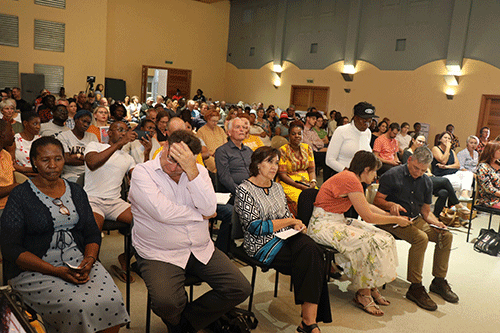The Parliamentary Standing Committee on Gender Equality, Social Development and Family Affairs has started its final round of public hearings in the Khomas region on the contentious issue of abortion. The hearings began recently and will continue until the end of the month.
The committee received three petitions on the emotive issue of whether or not to legalise abortion in Namibia, as well as calls to liberalise or reform Namibia’s current Abortion and Sterilisation (Act No. 2 of 1975).
In 2020, petitions from various interest groups were referred to the committee for further consideration.
Deputy health minister Esther Muinjangue motivated the motion on abortion in parliament in June 2020, saying national leaders should allow for debates on the issue to weigh the pros and cons.
A large number of people from all corners of Windhoek showed up at various centres to share their views and opinions regarding the laws governing abortions in Namibia.
The controversial issue sparked an interesting conversation during the hearing, with pro-choice and pro-life proponents debating whether to legalise abortion in the country.
Pro-choice proponents argued that women should have the right to choose what to do with their bodies and that keeping abortion illegal only leads to unsafe abortions that can result in maternal deaths.
The proponents called for a reform of Namibia’s current abortion legislation, which restricts access to safe abortions.
“Having an abortion is a difficult decision for any woman, which is why we often resort to it as a last option. In Namibia, women take risks by buying pills on the black market, thereby endangering their lives. In contrast, in South Africa, women can access abortion services at public hospitals and receive psychosocial support, which is not available to Namibians,” said pro-choice activist, Irene Garoes.
On the other hand, pro-life proponents argued that abortion is equivalent to taking a life. They urged the committee to maintain the current law, which criminalises abortion, except in cases where the mother’s life is at risk.
“Every life is valuable and should be protected from conception to natural death. Legalising abortion would be a step in the wrong direction, as it would condone the taking of innocent lives and undermine the sanctity of human life. Instead, we should focus on providing support and resources for pregnant women and their families, so that they can choose to give their child a chance at life,” said one of the attendees, Simeon Mekondjo.
The Committee’s findings and recommendations will be presented to the National Assembly for further action.
The hearings have been held in several constituencies and education institutions in the Khomas region, with communities in Katutura Central and East, as well as Khomasdal being consulted.
The public is still invited to attend and submit their input on the issue. – ashikololo@nepc.com.na


